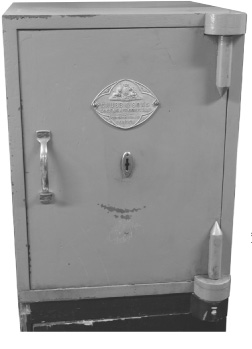
In 1882 this particular iron safe had an adornment: the derrière of one Charles Alcock, who was sat upon it, head in his hands, weeping at the death of English cricket, whose obituary was subsequently displayed in the Sporting Times.

History has allowed the name Charles Alcock to slip through its hands like a thick outside edge from a tail-ender. For here was a man who helped shape both cricket and football for decades, even centuries, to come through a combination of foresight and deft administration. So what was it Alcock contributed to cricket in the latter half of the nineteenth century? Born in 1842 and schooled at Harrow, Alcock’s first love was football. He and his brother John founded the Forest Club (later the Wanderers FC) in 1859, and both men were instrumental in establishing the Football Association in the 1860s. Establishing the FA was one thing, but it was Alcock who popularised football in the early 1870s with the introduction in 1872 of the FA Cup, a tournament won in its inaugural year by Alcock’s own Wanderers (he captained them in the final against the Royal Engineers in front of 2,000 fans at the Oval).
In fact, 1872 was a momentous year for Alcock: aside from leading Wanderers to victory in the FA Cup he umpired the first official football international between England and Scotland, and he was appointed secretary of Surrey Cricket Club. This was a masterstroke on the part of Surrey Cricket Club, for Alcock was a visionary who saw the potential of the Oval, sporting and financial.
Throughout the 1870s the Oval hosted England at football and rugby union, staged FA Cup Finals and was the venue for tennis matches. In 1878 the ground welcomed the touring Australians, a crowd of 20,000 (who were charged double the ordinary admission fee by Alcock – a shilling instead of sixpence) enjoying the sight of Alec Bannerman and Fred Spofforth in their prime.
As well as nurturing football and cricket, the indefatigable Alcock also founded and edited two magazines – Football Annual and Cricket – through which he spread his visions for both sports. Foremost among Alcock’s beliefs was that the best way to promote a sport was through competition. Never a fan of rugby union, Alcock couldn’t warm to a sport where most matches (at club level, at least) were meaningless friendlies. Having given football the FA Cup, Alcock proposed creating a one-day competition for cricket. Rebuffed on this front, he turned his attention to Test cricket.

History has allowed Charles Alcock to slip through its hands like a thick outside edge from a tail-ender
When Billy Murdoch’s Australian side arrived in England in 1880 they found fixtures hard to come by. Their predecessors of two years earlier had sullied the reputation of Australian cricket with their ‘commercial spirit’ and few counties were willing to play them. But while others shied away, Alcock stepped forward, seizing upon the tourists’ blank schedule to suggest an inaugural Test match between England and Australia to be staged at the Oval.
The Aussies were keen, so too, surprisingly, was Lord Harris, the ‘premier cricket-playing peer’, who usually had the last word on cricketing fixtures in England. His Lordship skippered the side (was that how Alcock won him over?) and W.G. Grace forfeited a week’s shooting to open the batting in what would be his first Test.
He duly scored a ton on his debut as England racked up a daunting 420 in their first innings. Australia were skittled out for 149 in reply (Fred Morley taking five for 56), though they fared better in following on, scoring 327, with Murdoch making a sparkling century. But England knocked off the runs to win the first Test match on English soil.
Two years later the Aussies were back and intent on revenge (as we shall see shortly), and though Alcock was left sitting on his safe with his head on his hands, the feeling of despair was fleeting. He continued to innovate for the rest of the century, turning Surrey into the strongest county in England and in 1885 averting a civil war in football by persuading the FA to vote for the professionalisation of the game.
Alcock has been hard done by history, ignored while others with grander titles or bigger mouths have claimed the credit for much of his work. As John Major says: ‘Alcock deserves a higher place in the mythology of the game than history has yet given him.’ So here’s our small contribution in elevating Alcock – a safe, rather fitting for a man whose perspicacity enriched both football and cricket.